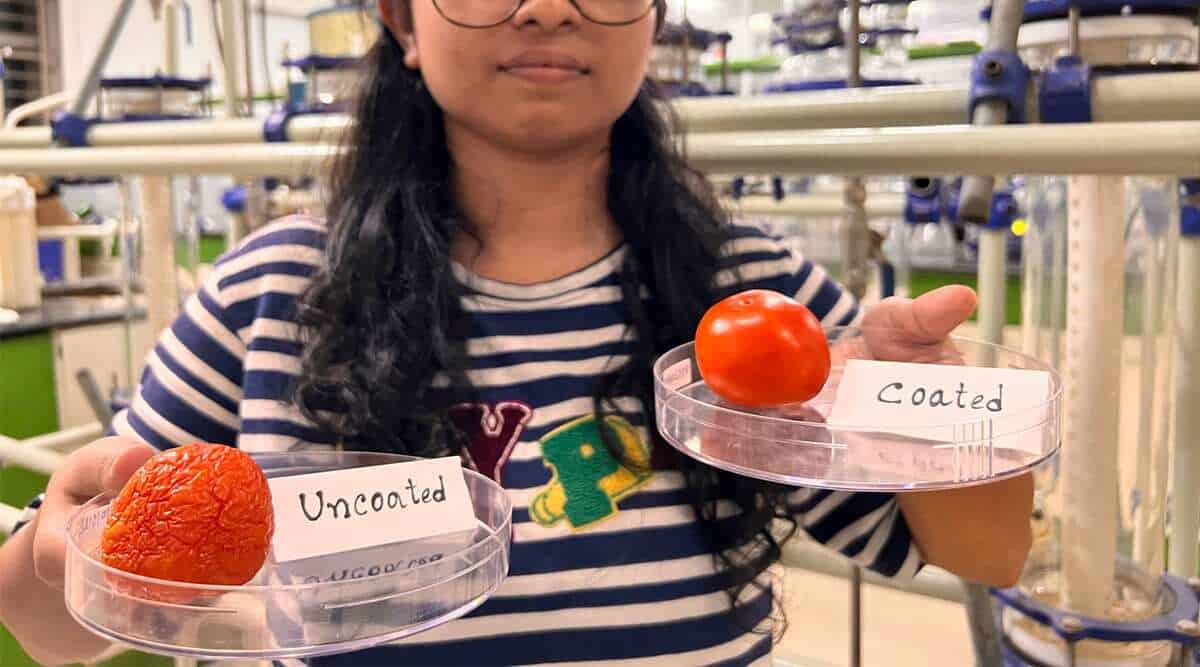Researchers at the IIT Guwahati have developed an edible coating that can extend the shelf-life of fruits and vegetables. Designed to prevent food wastage, the researchers found the coating can keep the produce fresh for much longer than it was possible without it.
They tested the coating on various vegetables and fruits including potatoes, tomatoes, green chillies, strawberries, mandarins, apples, pineapples, and kiwis.
“It can help preserve vegetables and fruits for as long as two months. For example, coating ripe tomatoes increased the shelf life of tomatoes by close to one month when compared to uncoated tomatoes, when stored under ambient temperatures. Also, it is difficult to keep strawberries fresh for more than 5 days. But with our coating, ripe strawberries can be preserved for more than 20 days,” Vimal Katiyar told indianexpress.com over email.
Katiyar led the research and is a professor at the Department of Chemical Engineering and Centre for Excellence in Sustainable Polymers at IIT Guwahati. The research findings have been published in the journal ACS Food Science & Technology in June.
The specialised coating was created using a mixture of two substances: micro-algae extract and polysaccharides. The extract is from the marine microalgae Dunaliella tertiolecta, which is often used as a source of algae oil, which is a health supplement that is a plant-based alternative to fish oil. Usually, after the extraction of algae oil, a residue from the process is discarded.
Katiyar and his team used extracts from this residue to formulate their film coating. The residue was combined with Chitosan, a sugar made by treating the outer skeleton of shellfish, to make it into an edible film.
Over the past six years, Katiyar and his team have been creating different versions of these coatings based on the fruits and vegetables they use.
“The end user does not require any special knowledge or machinery to apply the coating. These are very simple solutions that can be applied very easily. Farmers already used to use such produce handling solutions on a day-to-day basis,” said Katiyar.
The researchers ascertained the biosafety of these coatings by treating BHK-21 cells with the materials. These cells are derived from the kidneys of baby hamsters and are used in toxicology studies. From these tests, the researchers were able to conclude that the materials are non-toxic and could safely be used as edible produce coating. Katiyar did not comment on whether the coating requires studies to ascertain its long-term impact on health.
Also, Katiyar did not comment on what the material would cost right now but did say that it is ready to be turned into a commercial product. “Now, we are ready to bring it to commercial scale with the support of industries. I would like to ask the industries to help bring this important innovation to the market so that it can enhance farmers’ incomes,” he added.
Packaging 360 is a comprehensive knowledge sharing ecosystem for the Indian packaging industry. Our services include an online content platform to deliver news, insights and case studies; organising conferences seminars and customised training; Providing Bespoke Project Consulting, Market Research and Intelligence.







